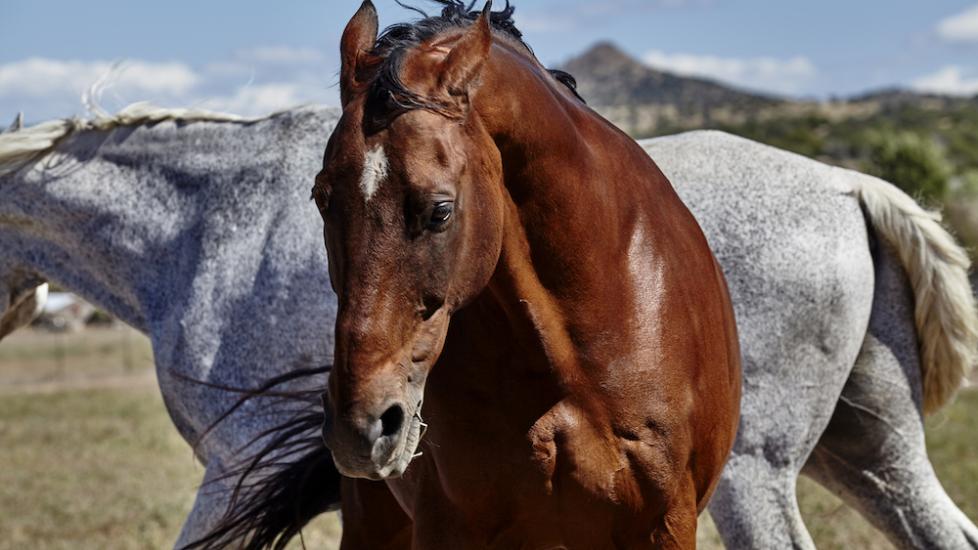Common Behavior Issues in Horses
What Are Behavior Issues in Horses?
Horses can display many behaviors that are considered undesirable (also called vices). Some of these behaviors are repetitive and seem pointless; these are called stereotypical behaviors.
Other behaviors are related to sexual hormones, eating, or aggression. These behaviors often result from stress or other issues in the environment and can be frustrating for owners. Veterinarians diagnose these behaviors based on commonly seen signs and can help horse owners figure out the cause to resolve or change the behavior.
Stereotypical Behavior Issues in Horses
Stereotypical behaviors are behaviors that horses display that are repetitive, meaning they do them repeatedly, and have no apparent purpose. These are often stress induced and can be very difficult to curb if the horse has made them a habit, even when the stressful stimulus is removed. The behaviors include:
-
Circling/pacing: Walking in tight circles in one or both directions or back and forth in a straight line often along a fence line or stall front.
-
Cribbing: Biting a fixed object with the horse’s incisors and pulling or sucking back with the neck and throat.
-
Weaving: Swaying from side to side while standing in place.
-
Pawing: Kicking at the floor, usually with a front limb.
Sexual Behavioral Issues in Horses
Sexual behavioral issues are often due to hormonal imbalances. These include:
-
Poor libido in stallions: Low testosterone can cause decreases in stallion motivation for breeding.
-
Nymphomania in mares: High sex drive or mares who act like stallions are often symptoms of hormonal imbalances in mare, sometimes secondary to ovarian tumors.
-
Silent heat in mares: Some mares don’t show strong signs of heat, although this is usually a desirable trait except in broodmares.
-
Geldings that act like stallions: Late gelding can result in aggressive, stud-like geldings. In rare cases, unidentified cryptorchidism (when the testicles never descended into the scrotum) can cause these symptoms as well.
Eating Disorders in Horses
Sometimes horses eat things other than food which can result in secondary gastrointestinal issues and complications. As with some of the other undesirable behaviors listed above, these can also be secondary to stress.
-
Pica: Eating of non-food material such as dirt, shavings, manure, and/or wood.
-
Anorexia: Horses may stop eating, possibly secondary to colic, illness, or other stress.
-
Obesity: Horses do not understand the need to keep a balanced diet. In nature, there isn’t always enough to eat, so horses will eat when food is available. In an environment where there is plentiful food, their natural instinct is still to eat continuously which can lead to weight gain.
Aggression in Horses
Aggression can be one of the most problematic behaviors in horses and also one of the most difficult to address. It is often a behavior that was ingrained at a young age after a newborn foal observed the behavior in the mother or after mistreatment by previous owners. In mares with foals, this can be a protective mechanism meant to defend the foal but can make it difficult to give the foal needed care. In stallions, aggression is often hormonally driven.
Aggression typically appears as ear pinning, biting, nipping, and kicking. These behaviors can be made toward humans as well as other horses and can make the horse dangerous to work with and be around.
How Do You Fix a Bad Horse Behavior?
Breaking a vice depends primarily on figuring out what caused it in the first place.
If the cause was stress, eliminate the stressful stimulus from the environment.
For aggressive stallions, castration may be necessary to curb the behaviors. In mares with undesirable behavior associated with their heat cycle, Regumate® may be prescribed to even out their hormones.
Some eating disorders are related to insufficient stimulation so providing more opportunities for enrichment activities such as slow feeders and treat balls can be beneficial.
Aggression is often based in fear so discovering what the horse is afraid of and building trust and respect can be key to resolving these behaviors.
It is important to work with your veterinarian, trainer, and barn manager when addressing undesirable behaviors. Not all behaviors can be completely eliminated but your chances of seeing improvement in your horse’s behavior are much higher if your care team is working together.
Featured Image: iStock.com/wingedwolf
